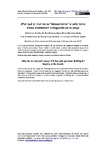¿Por qué el mar no se "desparrama" si solo tiene arena alrededor?Indagación en la playa

Use this link to cite
http://hdl.handle.net/2183/20017
Except where otherwise noted, this item's license is described as Atribución-CompartirIgual 3.0 España
Collections
Metadata
Show full item recordTitle
¿Por qué el mar no se "desparrama" si solo tiene arena alrededor?Indagación en la playaAlternative Title(s)
Why the sea doesn’t escape if it has only got sand holding it? Inquiry at the beachDate
2017Citation
Ápice. Revista de Educación Científica, 2017,1,2: 38-46. ISSN: 2531-016X
Abstract
[RESUMEN] En el presente artículo mostramos el diseño de una secuencia de indagación basada en modelos para Primaria para pensar, hacer, hablar y sentir sobre la playa. Esta secuencia surge de la reflexión de una educadora ambiental tras desarrollar el típico activismo de limpieza de costas o juegos motrices sobre biodiversidad, impactos o pesca[ABSTRACT] In the current paper the design of a teaching sequence through Model-Based Inquiry for Primary School is presented. Primary school students are engaged to think, do, talk, and feel science at the beach. This sequence arises from an environmental educator reflections after participating in the common activism activities of coast-cleaning or games on fishing and its environmental impacts on biodiversity.
Keywords
Playa
Indagación
Modelos
Secuencia de actividades
Educación primaria
Beach processes
Model-Based Inquiry
Teaching sequence
Primary school
Indagación
Modelos
Secuencia de actividades
Educación primaria
Beach processes
Model-Based Inquiry
Teaching sequence
Primary school
Editor version
Rights
Atribución-CompartirIgual 3.0 España
ISSN
2531-016X






